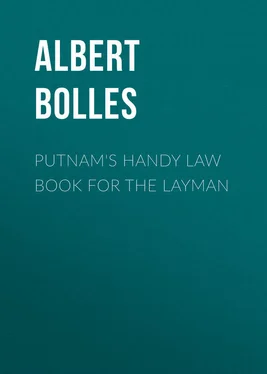Albert Bolles - Putnam's Handy Law Book for the Layman
Здесь есть возможность читать онлайн «Albert Bolles - Putnam's Handy Law Book for the Layman» — ознакомительный отрывок электронной книги совершенно бесплатно, а после прочтения отрывка купить полную версию. В некоторых случаях можно слушать аудио, скачать через торрент в формате fb2 и присутствует краткое содержание. Издательство: Иностранный паблик, Жанр: foreign_antique, foreign_prose, на английском языке. Описание произведения, (предисловие) а так же отзывы посетителей доступны на портале библиотеки ЛибКат.
- Название:Putnam's Handy Law Book for the Layman
- Автор:
- Издательство:Иностранный паблик
- Жанр:
- Год:неизвестен
- ISBN:нет данных
- Рейтинг книги:5 / 5. Голосов: 1
-
Избранное:Добавить в избранное
- Отзывы:
-
Ваша оценка:
- 100
- 1
- 2
- 3
- 4
- 5
Putnam's Handy Law Book for the Layman: краткое содержание, описание и аннотация
Предлагаем к чтению аннотацию, описание, краткое содержание или предисловие (зависит от того, что написал сам автор книги «Putnam's Handy Law Book for the Layman»). Если вы не нашли необходимую информацию о книге — напишите в комментариях, мы постараемся отыскать её.
Putnam's Handy Law Book for the Layman — читать онлайн ознакомительный отрывок
Ниже представлен текст книги, разбитый по страницам. Система сохранения места последней прочитанной страницы, позволяет с удобством читать онлайн бесплатно книгу «Putnam's Handy Law Book for the Layman», без необходимости каждый раз заново искать на чём Вы остановились. Поставьте закладку, и сможете в любой момент перейти на страницу, на которой закончили чтение.
Интервал:
Закладка:
Albert Sidney Bolles
Putnam's Handy Law Book for the Layman
FOREWORD
What useful purpose can this book serve? Most of the laws under which we live are kept, not from knowing them, but because the good sense of individuals leads them along legal ways. Yet in many cases their good sense fails to discover the right way. Thus, the receiver of a check on a bank must present it within a reasonable time after receiving it, and if he keeps it longer the risk of loss, should the bank fail, is his own. What is this reasonable time? One man says three days, another a week, another a month. So one's common sense fails to establish a definite reasonable time. It is needful to have the time fixed, and the law therefore has established a reasonable time. There are many cases like this in which one's common sense fails to furnish a correct, yet needful guide.
This little book contains many of the legal principles that are in most frequent use, as readers will learn who carefully read it. Again, if they do not always find an answer to their questions, it is believed that in many cases they will find enough law of a general nature from which they can safely solve their questions. They are therefore besought to do something more than merely consult this book for the purpose of finding ready and complete answers to their questions, to read it and become familiar with its contents.
Besides the law presented here the reader should learn to be cautious, and not trust too much his own judgment when no rule can be found for his guidance. Many a person has written his own will, as he has a right to do, and after giving a legacy to a relative or friend has nullified the gift by having the legatee, through the testator's ignorance, sign as a witness. The writer knew a railway president who had the temerity to draw the writing containing an important contract between his railroad and another, and who, by unintentionally putting a comma in the wrong place, made his road instead of the other responsible for large losses. If this book shall make the reader cautious concerning the legality of his undertakings, it will be worth to him many times its price.
A.S.B.Putnam's Handy Law Book for the Layman
Explanation of Terms.– At the outset the explanation of a few terms, often used, may be helpful to the reader. Among these are the terms statute and common law. Statute law or statutes mean the laws enacted by the state legislature and by the federal congress. Common law means the decisions made by the state and federal courts. These decisions may relate to the interpretation and application of statutes, or to the application of former decisions or precedents, or to the qualification and application of them, or to the making and application of new rules or principles where none exist that are needed to decide the case in hand.
It is a rule of the most general application that legal decisions are precedents which are to be followed in other cases of the same character. The decisions of the highest court in each state must be followed by the lower courts, but no courts in any state are obliged to follow the decisions of the courts in any other state. The courts in every state must also follow the decisions of the federal courts in all matters of a national character. Thus if a federal court decides the meaning or interpretation of a federal statute, a state court must follow the interpretation in a case requiring the application of that statute.
Again, common law decisions are not binding on the courts that make them like statutes or legislative commands. A decision may be modified or set aside when it is regarded as no longer applicable to the present condition of things. It may also be set aside or changed by legislative action. The common law is therefore always slowly changing like the ocean and is never at rest.
The common law forms much the largest part of the great body of law under which we live. This book is a collection chiefly of common law principles; a few statutes are interwoven here and there to complete the subjects presented.
The distinction also between civil and criminal law requires explanation. Nearly all criminal law is founded on statutes, in other words the statutes, state and federal, define nearly all legal crimes known to society. It is therefore true that the field of crime is not fixed, is in truth always changing. Thus formerly if a man bought goods on credit of another on the statement that he was worth fifty thousand dollars and the seller afterward learned that he was not worth fifty cents, the seller could sue the buyer to recover the value of the goods and for any additional loss, but could do no more. Many, perhaps all the states, now declare by statute that such an act is a crime, and the offender can be prosecuted by the state and fined or imprisoned or both. And the wrongdoer may still be sued in a civil action for the loss to the seller as before.
All crimes are prosecuted by the officers of the state chosen or appointed for that purpose. Again, as in the case mentioned, the wrongful act has a double aspect. An individual who has been wronged may proceed against the wrongdoer to recover his loss; the state also has been wronged and may also proceed against him. A good illustration is a bank defaulter. The bank may proceed through a court of law to recover the money lost by him, or from those who have promised to make the bank good should he wrongfully take anything; the state may also proceed against him as a criminal for breaking a statute that forbids him from doing such a thing. Furthermore, should the bank, as often happens, agree to accept a sum from the defaulter and not trouble him further, the agreement would be no bar to an action by the state against him.
The terms law and equity are frequently used in the law books and require explanation. Formerly there was no such term as equity in the common law. It came to be used as a supplement to the law to indicate ways of doing things unknown to the law, which ought to be done. Thus if a man threatened to fill up your well because it stood, as he claimed, on his land, you had no preventive remedy at law. You could use some force to prevent him, you could not kill him, or put out his eyes, or treat him roughly. The law only gave you the right to proceed against him to recover money damages for the legal injury. A court of equity has a preventive remedy. If one threatens to fill up your well you can petition or pray the court to order that he shall refrain until there has been a legal hearing to determine whether he has any right to do so and the court will order him to desist until it has heard the case, and will enforce its order with a fine or penalty should he disobey.
The term equity contains a larger element of justice than law; and the courts often say that an act is just or equitable, meaning that an act which is just or equitable may not always be a legal act. Equity therefore is a broader term, and is in constant use in legal proceedings.
Another word frequently used in this book is action. When a person has wronged another, for example, has not paid a promissory note that is due, and the wronged party wishes to collect it through the courts, he brings an action, so called, against the wrongdoer for that purpose. Sometimes the word suit is used. Suit, or case in court, is a common expression.
Finally something should be said about courts of law. Every state has three kinds or classes of courts. First a court in which suits are brought and tried relating to small matters, the recovery of money, for example, for one or two hundred dollars or less, also for small petty criminal offenses. Next is a higher court in which suits for all larger matters are begun and tried, as well as appeals from the lower court. Lastly is a third court of review, usually called the supreme court, composed in most of the states of five, or more often, seven judges, who review the decisions of the court below whenever application is made founded on erroneous matters, the wrongful admission of, or refusal to admit, evidence and the like, and their decisions form the great body of the common law.
Читать дальшеИнтервал:
Закладка:
Похожие книги на «Putnam's Handy Law Book for the Layman»
Представляем Вашему вниманию похожие книги на «Putnam's Handy Law Book for the Layman» списком для выбора. Мы отобрали схожую по названию и смыслу литературу в надежде предоставить читателям больше вариантов отыскать новые, интересные, ещё непрочитанные произведения.
Обсуждение, отзывы о книге «Putnam's Handy Law Book for the Layman» и просто собственные мнения читателей. Оставьте ваши комментарии, напишите, что Вы думаете о произведении, его смысле или главных героях. Укажите что конкретно понравилось, а что нет, и почему Вы так считаете.












